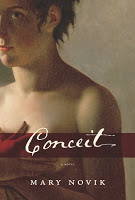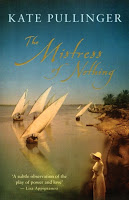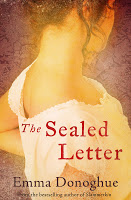 On its surface, the novel Conceit by Mary Novik is a fairly straightforward story. John Donne, a seventeenth century metaphysical poet, marries Ann More without her father’s permission. This love match sends him to jail for a time and upon his release the couple live in relative poverty for a number of years, as he has lost his position and has been relegated to the country and does not receive Ann’s dowry for a number of years.
On its surface, the novel Conceit by Mary Novik is a fairly straightforward story. John Donne, a seventeenth century metaphysical poet, marries Ann More without her father’s permission. This love match sends him to jail for a time and upon his release the couple live in relative poverty for a number of years, as he has lost his position and has been relegated to the country and does not receive Ann’s dowry for a number of years.
Ann produces twelve children (living and dead) by the time she is 33 years of age, when she sadly dies in childbirth. Donne pledges eternal devotion to her and vows to be buried beside her. The motherless children are raised by their father, who’s fortune changes with his position in King James court as an Anglican priest. Pegge, one of the younger children, contracts smallpox which disfigures her face and causes her to lose her hair. This, coupled with her late physical development, ties her to her father for longer than her siblings.
Pegge, a passionate girl, attempts a love affair with Izaak Walton but is rebuffed. She sees her father through his death and then marries William Bowes. She goes on to produce many children herself. The story ends with her dramatic rescue of her father’s effigy from
 Possession by A.S. Byatt – “Possession, for which Byatt won England’s prestigious Booker Prize, was praised by critics on both sides of the Atlantic when it was first published in 1990. “On academic rivalry and obsession, Byatt is delicious. On the nature of possession–the lover by the beloved, the biographer by his subject–she is profound,” said The Sunday Times. The New Yorker dubbed it “more fun to read than The Name of the Rose . . . Its prankish verve [and] monstrous richness of detail [make for] a one-woman variety show of literary styles and types.” The novel traces a pair of young academics–Roland Michell and Maud Bailey–as they uncover a clandestine love affair between two long-dead Victorian poets. Interwoven in a mesmerizing pastiche are love letters and fairytales, extracts from biographies and scholarly accounts, creating a sensuous and utterly delightful novel of ideas and passions.” – publisher
Possession by A.S. Byatt – “Possession, for which Byatt won England’s prestigious Booker Prize, was praised by critics on both sides of the Atlantic when it was first published in 1990. “On academic rivalry and obsession, Byatt is delicious. On the nature of possession–the lover by the beloved, the biographer by his subject–she is profound,” said The Sunday Times. The New Yorker dubbed it “more fun to read than The Name of the Rose . . . Its prankish verve [and] monstrous richness of detail [make for] a one-woman variety show of literary styles and types.” The novel traces a pair of young academics–Roland Michell and Maud Bailey–as they uncover a clandestine love affair between two long-dead Victorian poets. Interwoven in a mesmerizing pastiche are love letters and fairytales, extracts from biographies and scholarly accounts, creating a sensuous and utterly delightful novel of ideas and passions.” – publisher
 The Mistress of Nothing by Kate Pullinger – “Lady Duff Gordon is the toast of Victorian London society. But when her debilitating tuberculosis means exile, she and her devoted lady’s maid, Sally, set sail for Egypt. It is Sally who describes, with a mixture of wonder and trepidation, the odd ménage (marshaled by the resourceful Omar) that travels down the Nile to a new life in. When Lady Duff Gordon undoes her stays and takes to native dress, throwing herself into weekly salons, language lessons and excursions to the tombs, Sally too adapts to a new world, which affords her heady and heartfelt freedoms never known before. But freedom is a luxury that a maid can ill-afford, and when Sally grasps more than her status entitles her to, she is brutally reminded that she is mistress of nothing.” – publisher
The Mistress of Nothing by Kate Pullinger – “Lady Duff Gordon is the toast of Victorian London society. But when her debilitating tuberculosis means exile, she and her devoted lady’s maid, Sally, set sail for Egypt. It is Sally who describes, with a mixture of wonder and trepidation, the odd ménage (marshaled by the resourceful Omar) that travels down the Nile to a new life in. When Lady Duff Gordon undoes her stays and takes to native dress, throwing herself into weekly salons, language lessons and excursions to the tombs, Sally too adapts to a new world, which affords her heady and heartfelt freedoms never known before. But freedom is a luxury that a maid can ill-afford, and when Sally grasps more than her status entitles her to, she is brutally reminded that she is mistress of nothing.” – publisher
 The Sealed Letter by Emma Donoghue – “Miss Emily “Fido” Faithfull is a “woman of business” and a spinster pioneer of the British women’s movement, independent of mind but naively trusting of heart. Distracted from her beloved cause by the sudden return of her once-dear friend, the unhappily wed Helen Codrington, Fido is swept up in the intimate details of Helen’s failing marriage to the stodgy Admiral Harry Codrington. What begins as a loyal effort to help a friend explodes into a courtroom drama more sensational than any tabloid could invent – with stained clothing, accusations of adultery, counterclaims of rape and a mysterious letter that could destroy more than one life.” – publisher
The Sealed Letter by Emma Donoghue – “Miss Emily “Fido” Faithfull is a “woman of business” and a spinster pioneer of the British women’s movement, independent of mind but naively trusting of heart. Distracted from her beloved cause by the sudden return of her once-dear friend, the unhappily wed Helen Codrington, Fido is swept up in the intimate details of Helen’s failing marriage to the stodgy Admiral Harry Codrington. What begins as a loyal effort to help a friend explodes into a courtroom drama more sensational than any tabloid could invent – with stained clothing, accusations of adultery, counterclaims of rape and a mysterious letter that could destroy more than one life.” – publisher


